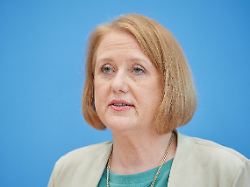Family Minister Paus and Finance Minister Lindner agree on a draft law on basic child security. On Monday evening, guests talk about it on the ARD program “Hart aber fair”. One thing is clear: child poverty will not be eliminated.
“It’s a really, really good law,” said Federal Minister for Family Affairs Lisa Paus on Monday evening in the ARD daily topics. But she qualifies: “With this law, there will still be child poverty in Germany.” But at least it got off the ground. “It would have been nicer differently,” Paus admits – and hints at the next dispute in the traffic light coalition: “We’re recalculating the socio-cultural subsistence level.” She assumes that there will be performance increases afterwards – and speaks of 20 to 28 euros. Federal Finance Minister Lindner had previously ruled out increases in benefits, with one restriction: for children under six years of age, eight euros are added per month. At the end of the short interview, she only hinted at the fact that the new basic child security system is actually not the big hit that the Greens politician had hoped for: “There was no damage to the matter,” she says.
In doing so, she unconsciously expresses what the CDU member of the Bundestag Serap Güler also criticized in the program “Hart aber Fair”: “I don’t think the law is a big hit.” And she complains: “I would have wished for a real system change. That means that you don’t approach the matter with the watering can principle. I would have wished for a paradigm shift.” There would be, praises Ricarda Lang, co-head of the Greens: “I’m not disappointed. For me, the law is a very clear step forward.”
From 2025, all children and young people should receive a guaranteed amount independent of their income. This replaces the previous child benefit. There may be an additional amount depending on the income of the parents and the age of the children. It is primarily intended to help children from families whose parents work but still have little money. And then the socio-cultural subsistence level should be recalculated. This is the amount that you need to participate in social life while thriving. Heinz Hilgers believes that this currently seems comparatively unrealistic. According to this, a 13-year-old boy currently needs four euros a day for food and drink, an infant is entitled to six euros for diapers – a month. And that’s exactly where things have to change, says the honorary chairman of the child protection association. “When it comes to today’s children, you need more money,” demands Hilgers.
Only 2.4 billion euros remained
The new law does not provide for that. Of the originally 12 billion euros that the Minister for Family Affairs had set for basic child security, 2.4 billion remain in the end – that’s about 16 percent. However, administration costs are deducted from this, Serap Güler has calculated. In fact, the benefits for poorer children should no longer come from the job center, but from the family fund. However, this requires significantly more staff.
In addition, there is a change that Ricarda Lang rightly praises: “We are moving away from a debt to collect, in which parents dig through a bureaucracy jungle, towards a debt to bring, i.e. a state service for all families. And we stop paying children in the To treat citizens’ benefit like little jobseekers and say: These are children who have a right to participation. That is a paradigm shift.”
In fact, families will in future be informed by the Family Benefits Office that they can apply for benefits for children, and the applications should also be clearer. In addition, Lang explains: “One must also say that the 2.4 billion euros mentioned are only one building block.” The federal government has increased child benefit significantly, and inflation would also increase the standard rates for citizen benefit again. Lang assumes at least 40 euros. She apparently forgets that an increase in citizen income only absorbs the prices that have risen due to inflation. And Heinz Hilgers also explains: “No family with basic income benefits from an increase in child benefit. It is offset directly against it. An increase in child benefit does not bring them a single cent.”
How it goes on
The draft law is now to be discussed first in the coalition and in November or December by the Bundestag. Then there might be a few more changes. Serap Güler has an idea: an adjustment of the tax allowance for children – from which rich families in particular benefit – to the child benefit. “I don’t think it’s a good thing that families with higher incomes get more money from the child allowance than families with lower incomes from child benefits.” Ricarda Lang is happy to hear that and immediately suggests changing exactly that this year.
And should the two women actually implement the proposal, Minister Paus could rightly say: “In the end, no damage was done to the matter.”
